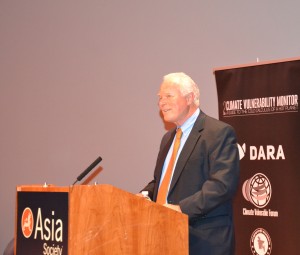October 19, 2012
A word from Ross Mountain: October 2012
Climate change thinking received a shot in the arm with the launch of the second edition of DARA’s Climate Vulnerability Monitor developed on behalf of the Climate Vulnerable Forum, an international initiative currently led by Bangladesh.
The simple but important messages of the Monitor are for widest consumption. Its pages detail how climate change is already an important influence on the world today: driving humanitarian crises like food emergencies and mass floods; slowing progress on human development; with inaction on climate change holding back the growth of the world economy in a time of fiscal crises.
Anchored in the most recent research available, its findings may just be game-changing: It is the most comprehensive ever assessment of the current global human and economic costs of climate change and the carbon economy so far made public. A hotter more polluted planet changes a lot. The Monitor covers 34 indicators itemizing almost everything that experiences effects from drought and flooding to occupational heat stress, energy use for cooling or heating, and consequences for communicable disease or economic sectors like agriculture and fisheries. Simply filling the pages of this encyclopedic volume are examples for how all these effects play out, such as outdoor workers struggling to be productive in warm regions as the number of extremely hot days explosively increases with every passing decade. Data spans 184 countries in both 2010 and 2030, with some key findings including:
- The human impact of reliance on carbon intensive forms of energy together with climate change leave a combined toll of some 5 million deaths each year.
- Failure to act on climate change already costs the world economy 1.7% of global GDP (1.2 trillion US dollars), a figure which will double as a share of GDP by 2030 due to rapidly escalating temperatures and carbon-related pollution.
- Losses for lower-income countries are already extreme: over 7% GDP on average for Least Developed Countries already now.
- Major economies like China and the US are not spared losses; all regions of the world gain or face no costs from the most ambitious and comprehensive responses to climate change.
- Economic losses dwarf the modest costs tackling climate change through efforts to reduce risks, increase community resilience and transitioning to a low-carbon footing.
- Internationally coordinated responses will reduce the costs and heighten the benefits of actions to address climate change for all concerned.
The extent to which the world’s poorest and most vulnerable are by far the hardest hit is particularly compelling: the poorest populations in the poorest communities of the poorest countries are suffering most of all. Implications for the Millennium Development Goals are extensive with the biggest impacts a mirror image of lag areas in progress by goal, region and demographic group. Without climate change, might we already be there? With climate change, many goals are likely not to be met by 2015. Our whole poverty reduction model is at serious risk.
Subtitled A Guide to the Cold Calculus of a Hot Planet, the report contrasts the immense human and economic costs of inaction with the cold-hearted monetary benefits that are actually estimated by the Monitor to result from substantial, early and sustained action on climate change: It is possible to tackle the root causes and many of the ramifications of climate change all while generating economic benefits, supporting sustainable human development, and improving the crisis resilience of vulnerable populations.
The Monitor’s message continues to gather momentum since its high-level launch in New York on September 26th at the Asia Society involving the Prime Minister of Bangladesh and other Climate Vulnerable Forum leaders together with key officials from international organizations, civil society and business. Global interest is evident in the hundreds of stories reported in the media around the world.
Welcomed by Climate Vulnerable Forum governments, a Ministerial delegation composed of Bangladesh, Maldives and Costa Rica (respectively current, past and incoming Forum Chairs) took its findings to Washington DC with a presentation at the Center for Global Development, the State Department and the World Bank. All expressed keen interest in using the Monitor and its data joining the ranks of major agencies and institutions from security think tanks, to banks and humanitarian and development organizations like World Vision International, who already use it as a policy, communication or analytical tool.
It serves all these groups going forward as a sound case for concerted efforts to deepen and hasten both the low-carbon transition and support for vulnerable populations in adapting to the growing challenges faced. Climate change deniers will find little solace in its pages.
The support of so many prominent policy-makers and institutional partners such as UNDP, UNISDR, TckTckTck, CARE, CDKN, Oxfam, World Vision, and ITUC among others are truly indispensible to helping translate these messages into action.
We are extremely pleased therefore to announce the establishment of a truly unique international multi-partner Trust Fund to support this important work. Managed by the UNDP Multi Donor Trust Fund Office, it will support the Climate Vulnerable Forum, including advocacy and knowledge sharing activities of the now 20 plus governments involved. The Trust Fund is being supported by UNDP, UNISDR and the WMO together with DARA.
The case for immediate action has seriously strengthened. The foundations are in place. The heavy work of recovering our future is before us all.

Share this